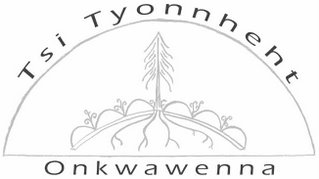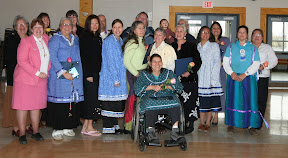
why did you come to FNTI?
I decided to attend FNTI while I was working as an Aboriginal News reporter
for (Haliburton Broadcasting Group) in Parry Sound. I did not have an
education in the biz. And I did not like the way stories on Aboriginal
people were covered in mainstream media at large. I also had a one-hour
Aboriginal program to produce weekly, and had no clue what kind of content I
should include.
how has the FNTI/media program(Indigenous Communications Journalism) experience changed you?
It has helped give me a stronger voice to tell stories from my own
community. FNTI has also been a great source of support while I have
been in different work environments, and continues to be there for me!!!
My programs improved greatly at HBG while I was attending school
with more content and in-depth stories.
Also, during my time at FNTI, I have moved around quite a bit,
wanting to experience different types of media. I've since worked
for a private radio group in Kansas, U.S.A, as well as CBC radio
in Sudbury, and have written a few freelance print stories for
Aboriginal publications. Both of those experiences have been in
mainstream media. I covered mainstream news. In Kansas, I worked
in Hiawatha, where there were about 5 Indian Reservations in the
area. I ensured there was Native American Indian news content from
those communities in my news.
Talk about where you're working...
I have since returned to the hub of HBG in Parry Sound. I have
gone full-circle so to speak. I am currently the News Director
and Operations Manager in Parry Sound. I anchor the morning news,
as well as co-host with my buddy Dave Chisholm. I am having a
GREAT time. I make sure there is local news every day, with news
from local First Nations as well. It's not like work at all. So,
in essence, I get paid to have fun. I absolutely love radio!!!!!
Would like to know what its like for a mother to go back to school
and how you made it work?
Well, I always say, where there's a will, theres a way. It wasn't
hard for me to return to school. I have two absolutely terrific
teens, Dmitri and Deidre. I also have a very supportive extended
family, who helped keep an eye on my kids while I was away at
school. I missed them a lot while I was away, especially the first
session at school, which lasted six weeks. That seemed like an
eternity to me because I have never been away from them for that
long. It has all been worth it now, with my new position. My kids
are happy that I am happy, as well as proud of me.
and the wisdom that you have recieved through the years?
Wisdom throughout the years? I don't know about that. I just do
what I LOVE. Theres no time for anything else.
(make sure to wear clean underwear everyday! wear a bra that fits!
And laugh lots everyday!!!!)






